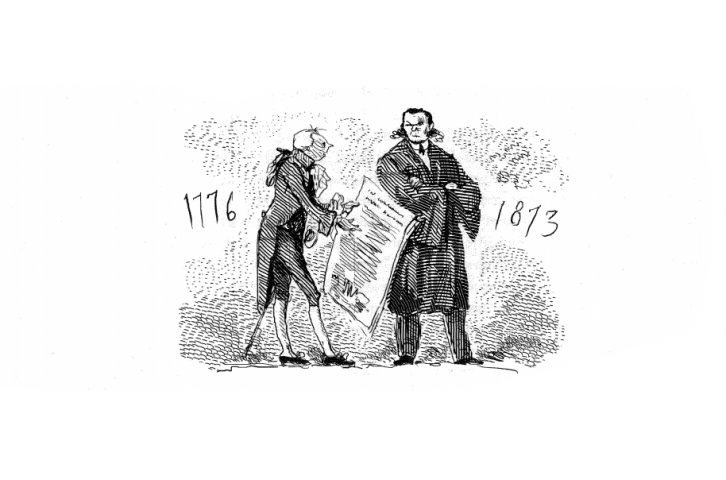Books Reviewed
A review of Abraham Lincoln's Political Faith, by Joseph R. Fornieri
In the recent Newdow case, the United States Supreme Court avoided deciding whether the words "under God" in the Pledge of Allegiance are unconstitutional by holding that the plaintiff lacked standing to bring the case. But no one thinks that the issue is finally settled. That it could arise at all is a measure of how much we have forgotten our nation's first principles. It is the merit of Abraham Lincoln's Political Faith that it reminds us that our nation is not founded on hostility or indifference towards God, but that it indeed rests upon a particular conception of the divine, a conception that is perfectly appropriate to acknowledge in the Pledge and necessary for us to express in our public life.
The words "under God" were placed in the pledge during the Cold War when Congress wished to make even more clear how our beliefs differed from those of the Communists. It is sometimes suggested that the words are therefore illegitimate—that they are tied to an obsolete historical situation or reflect an anti-Communist extremism. But the Communist threat was merely the occasion that reminded Congress of something fundamental. As Fornieri points out, "The ideologies of Communism and fascism both sought to murder the Judeo-Christian God and to replace Him with a human power that was beyond good and evil and freed from any higher moral obligation." The result was the rule of tyrants who "sought to wield both the sacred and the secular swords with absolute power, becoming a law unto themselves [from] which there could be no higher appeal in either principle or practice." To acknowledge God's rule is to recognize that human beings are not the masters of their fate or of the universe, and hence that human government is properly limited in scope. As Fornieri correctly notes and explains at length, such a belief is not a violation of the separation of church and state, but the very foundation of it.
In his great biography of Lincoln, Lord Charnwood noted that no other speech of a modern statesman uses so unreservedly the language of intense religious feeling as Lincoln's Second Inaugural. One can add that behind that intensity was a clarity of thought to match. As with so many of America's beliefs, the relationship between belief in God and American political principles was more deeply understood by Abraham Lincoln than by any other American statesman. In Abraham Lincoln's Political Faith, Joseph Fornieri attempts to give a comprehensive portrayal of Lincoln's understanding of this relationship.
Fornieri begins this portrayal by outlining Lincoln's private or personal faith. He calls this faith "biblical" because Lincoln seemed to form it out of his own reading of the Bible, because it does not seem to be an exclusively New Testament faith, and because Lincoln did not formally join any Christian denomination. To establish his reading he uses Lincoln's private correspondence, testimony from those who knew him, and inferences from the beliefs of those who appeared to have influenced him. In then comparing this faith to his public references to God or the Bible, Fornieri shows that Lincoln's private and public statements were consistent with each other, and argues that Lincoln's public words and deeds were an expression of his personal faith applied to the political realm.
This procedure has the merit of showing that Lincoln did not say or do one thing in private and another in public. He was not a hypocrite, a charge that has sometimes been made and against which Fornieri is eager to defend Lincoln. But it creates two problems that risk obscuring the larger public issues that are at the heart of what the author wants to address. It leaves the reader open to the thought that Lincoln's public references to God and the Bible, and perhaps his politics in general, were merely the expression of his own idiosyncratic faith, and therefore not of much relevance to our situation. This is an implication that Fornieri would vigorously deny. And it is open to the objection that he is seeking to understand what is more evident, Lincoln's open public statements, by what is less evident, his private faith that must be inferred from hints from friends and acquaintances. Fornieri does marshal the evidence about Lincoln's private faith as well and convincingly as it has ever been done, but we are still left with the reality that was only slightly exaggerated by his law partner, William Herndon, when he said that Lincoln was "the most secretive, reticent, shut-mouthed man that ever existed."
* * *
Fortunately, Fornieri does not confine himself to showing Lincoln's public and private consistency. At the beginning of his discussion of Lincoln's public faith, Fornieri acknowledges, "Lincoln's biblical republicanism developed as an urgent response to the political challenges of his own time, not as an abstract doctrine composed from some Archimedean vantage point outside the political realm." Fornieri sees that Lincoln did not have one set of thoughts about the Bible, and another set of thoughts about politics, which he then somehow combined. Nor did he simply have a set of religious views, which, from an Archimedean vantage point, he used to judge politics and determine his own actions. Rather Lincoln's thoughts about God and his thoughts about politics were bound up together and woven of the same cloth. This is presumably why Fornieri refers in the title to Lincoln's "political faith" rather than to his "religious faith and political beliefs." And it is why the God Lincoln reveals to us is not merely Lincoln's God, but the God of our country and our political principles.
Nowhere does Fornieri show this more clearly than in his fine chapter on Lincoln and pro-slavery theology. Lincoln understood that slavery was not merely an economic system, but "part of an overarching worldview that suffused Southern culture." That worldview had theological implications and a theological defense that was powerful in shaping Southern opinion. With succinctness and clarity, Fornieri lays out the biblical and theological arguments used by Southerners to justify slavery and shows the distortions and inconsistencies they had to engage in to make these arguments. He shows that their attack upon the principles of human equality, consent of the governed, free labor, and the Union had a necessary foundation in the claim that "God has actually embodied slavery in his moral law."
In his Second Inaugural Address, Lincoln noted that both North and South "read the same Bible, and pray to the same God; and each invokes his aid against the other." He then pointed out the perversity in Southern Bible-reading and praying, before counseling his countrymen to look at their own sin: "It may seem strange that any men should dare ask a just God's assistance in wringing their bread from the sweat of other men's faces, but let us judge not that we be not judged." Lincoln's response to the observation that both Southerners and Northerners cited the Bible in their own behalf was not to conclude that the Bible therefore provided no guidance. Rather, Fornieri shows that Lincoln not only refuted the Southerners' interpretation of the Bible on biblical, theological, and political grounds, but that his own views rested upon a superior understanding of the Bible and of politics. As Fornieri concludes, "Lincoln's invocation of the Bible did not stand alone as a literal appeal; the moral precepts of reason, revelation, and republicanism confirmed one another."
There are other good parts to this book. Fornieri weaves together nicely Lincoln's understanding of the moral and political principles of the Declaration of Independence and the theology that he realized those principles required. And although some of the ground he covers in describing Lincoln's understanding and actions has been covered elsewhere, it bears repeating.
* * *
But there is an aspect of this book that does mar its excellence. The book too much betrays its origin as a doctoral dissertation, in which one asserts one's own right to speak by showing that others have not spoken well. The desire to find people to attack sometimes distorts both the structure and the judgments of the book. In his chapter on the "Development of Lincoln's Political Faith," Fornieri spends the first half of it attacking all those (including myself) who think that the Lyceum and Temperance Addresses display some thought on Lincoln's part. It is easy to see, Fornieri demurs, that these speeches simply express the conventional sentiments of any young Whig. The second half is then devoted to an exposition of the Peoria Speech of 1854 as the preeminent expression of Lincoln's political faith. The result is to leave the impression, contradicted by other parts of the book, that Lincoln's political faith did not seriously begin to develop as a thoughtful position until 1854. I cannot examine in detail Fornieri's contentions about the Lyceum and Temperance Addresses, but I note that it is never wise to assume that Lincoln was an unthinking automaton at any point in his life. We should, rather, take a lesson from the greatest of contemporary Lincoln scholars, Harry V. Jaffa, who wrote at the beginning of A New Birth of Freedom, "I have never discovered any reason to think myself wiser than Abraham Lincoln."
In a similarly combative and indiscriminate spirit Fornieri attacks those with whom he disagrees by slapping labels on them. The particular villains are "Straussians," "Psychohistorians," and "Southern Conservatives." This labeling leads to some bizarre interpretations of other people's work. To cite an example from my own writing: in trying to describe the relationship between the Gettysburg Address and the Second Inaugural, I once argued that Lincoln developed a political religion "with a dual viewpoint; one that of the nation, the other transcending it." I was pointing to the fact that Lincoln in the Gettysburg Address draws our attention to "four score and seven years ago," the date of the founding of the nation, while in the Second Inaugural he points beyond the nation to "as was said three thousand years ago, so still it must be said…." But since Fornieri "knows" that "Straussians" like Thurow are followers of Spinoza and have secret teachings, he takes my statement as evidence that I believe there was one teaching (a religious one) for the "nation" and another (a secular one) for those elite who "transcend" the common herd. The Second Inaugural a secular teaching meant only for an elite? This, and many similar misinterpretations of others' writings, are saved from being pernicious only by being silly.
But it is possible to read past these defects and look at the Lincoln Fornieri so clearly and properly admires. Among his many other gifts to us, this Lincoln shows us that the political principles underlying our nation depend upon faith in a God who rules all with both justice and charity. And although it is not the last word on the subject, Fornieri's book can help us to understand more fully that we as a nation cannot abandon our acknowledgment of God's rule without also abandoning those principles that make our nation so worth preserving and perpetuating.



